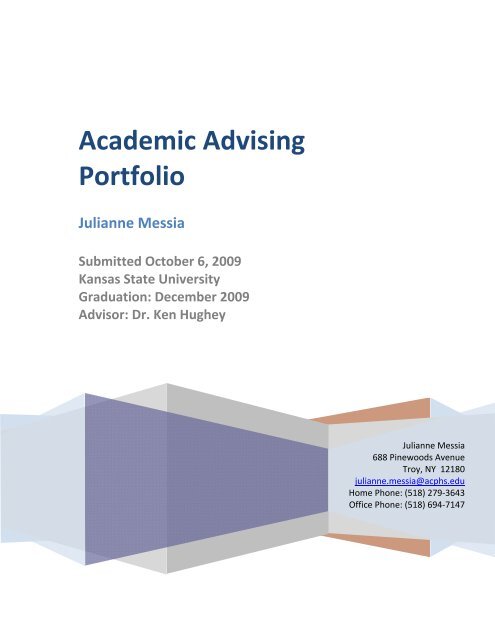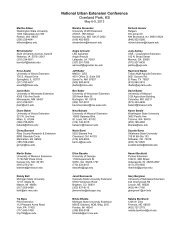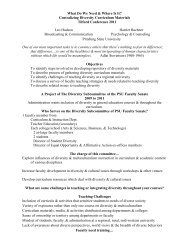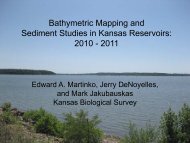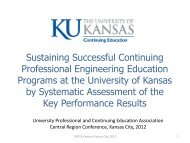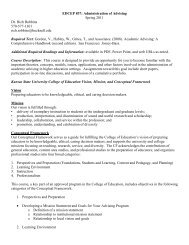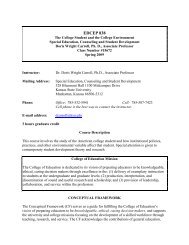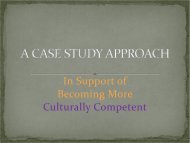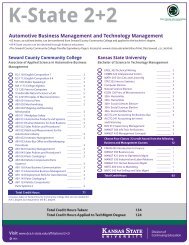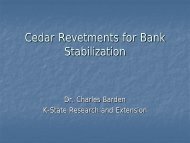Academic Advising Portfolio - Division of Continuing Education ...
Academic Advising Portfolio - Division of Continuing Education ...
Academic Advising Portfolio - Division of Continuing Education ...
Create successful ePaper yourself
Turn your PDF publications into a flip-book with our unique Google optimized e-Paper software.
<strong>Academic</strong> <strong>Advising</strong><br />
<strong>Portfolio</strong><br />
Julianne Messia<br />
Submitted October 6, 2009<br />
Kansas State University<br />
Graduation: December 2009<br />
Advisor: Dr. Ken Hughey<br />
Julianne Messia<br />
688 Pinewoods Avenue<br />
Troy, NY 12180<br />
julianne.messia@acphs.edu<br />
Home Phone: (518) 279‐3643<br />
Office Phone: (518) 694‐7147
2<br />
TABLE OF CONTENTS<br />
Résumé 3<br />
Philosophy <strong>of</strong> <strong>Academic</strong> <strong>Advising</strong> Statement 5<br />
<strong>Portfolio</strong> Option 1: Case Studies 8<br />
Case Study 1: Adrienne Mahan 9<br />
Case Study 2: Brandon Phuong 20
Julianne Messia<br />
688 Pinewoods Avenue, Troy, NY 12180 (518)279‐3643<br />
julianne.messia@gmail.com<br />
Objective<br />
To obtain an administrative position in academic advising at a higher education institution.<br />
Experience<br />
<strong>Academic</strong> Support Coordinator, Albany College <strong>of</strong> Pharmacy and Health Sciences<br />
Albany, NY<br />
January 2006‐present<br />
• <strong>Academic</strong> advisor to approximately 200 high‐achieving first‐year students.<br />
• Responsible for the Peer Tutoring Program, including hiring, interviewing, training, coordinating<br />
over 40 parapr<strong>of</strong>essional student tutors.<br />
• Coordinate the first‐year experience program, PASSPORT to Success.<br />
• Advisor to the Peer Mentor Program.<br />
• Maintain records and provide training for Peer Tutoring CRLA Level I Tutor Certification.<br />
• Committees: Institutional Review Board, <strong>Academic</strong> <strong>Advising</strong> Committee, Vermont<br />
Implementation Team, Middle States Commission on Higher <strong>Education</strong> Accreditation Self‐Study.<br />
English Composition Instructor, Mildred‐Elley<br />
Latham, NY September 2005 – January 2006<br />
• Provided high quality instruction and one‐on‐one assistance to first year students.<br />
• Assisted students in the building <strong>of</strong> effective essay writing and grammar skills.<br />
• Developed assessments <strong>of</strong> student learning and provided high quality student feedback.<br />
• Served as mentor for students and provided academic guidance during bi‐weekly <strong>of</strong>fice hours.<br />
Administrator <strong>of</strong> Tutorial Services and Summer Bridge, University <strong>of</strong> the Sciences in Philadelphia<br />
Philadelphia, PA September 2003 – August 2005<br />
• Hired, trained, supervised, and coordinated 60 undergraduate and graduate peer tutors.<br />
• Designed and coordinated the Summer Bridge 4‐week pre‐college residential program for at‐risk<br />
students.<br />
• Created and presented weekly study skills seminars open to all students on topics <strong>of</strong> critical and<br />
creative thinking, test‐taking skills, note‐taking skills, and stress management.<br />
• Designed and coordinated the Supplemental Instruction (SI) Program.<br />
• Implemented and analyzed assessments <strong>of</strong> tutoring, study skills seminars, and SI programs.<br />
• Committees: First Year Experience, Student Conduct, Student Grievance, Teaching<br />
Environments.<br />
Teaching Intern, Johns Hopkins University Center for Talented Youth Summer Programs<br />
Course: Writing and Imagination, Sessions I and II<br />
Bethlehem, PA and Stanford, CA Summer 2002, Summer 2003 respectively<br />
• Collaborated with instructors on curriculum and exercises for a small class <strong>of</strong> 12 gifted students<br />
between the ages <strong>of</strong> 10‐12.<br />
• Facilitated daily journal entries and all poetry writing lessons and exercises.<br />
• Met with students and parents for conferences upon request.<br />
• Responsible for classroom management and supervision during breaks.<br />
• Communicated concerns about student wellness with their Residential Assistants.<br />
• Graded student portfolios and conducted student evaluations.<br />
3
4<br />
<strong>Education</strong><br />
M.S. <strong>Academic</strong> <strong>Advising</strong>, Administration • Kansas State University, Manhattan, KS • December 2009<br />
M.S. <strong>Education</strong>al Administration and Policy Studies, Higher <strong>Education</strong> • University at Albany, NY •<br />
December 2007<br />
Graduate Certificate in <strong>Academic</strong> <strong>Advising</strong> • Kansas State University, Manhattan, KS • May 2005<br />
B.A. English • Minor: Honors • Magna cum laude • Arcadia University, Glenside, PA • May 2003<br />
Awards:<br />
• Honor Societies: Phi Kappa Phi, Sigma Tau Delta<br />
• Dean’s Distinguished Honors List, 1999‐2003 consecutively<br />
• Elaine B. Maimon Award for Excellence in Freshman Writing, 2000<br />
Presentations<br />
• “Minute by Minute: Embracing Change and Your Many Roles.” National <strong>Academic</strong> <strong>Advising</strong><br />
Association Northeast Region 1 Conference. Saratoga Springs, NY. March 2009.<br />
• “Tutor Coordinators: A Staggering Model.” Concurrent Session. National Collegiate Learning<br />
Center Association Annual Conference. Harrisburg, PA. October 2006.<br />
• “Understanding the Millennial Student.” Lunch and Learn presentation. Campus Life Staff<br />
Pr<strong>of</strong>essional Development Series. Drexel University, main campus. January 2005.<br />
• “Understanding the Millennial Student.” Keynote presentation. Physician Assistant Faculty<br />
Advisor Training. Drexel University, Hahnemann campus. January 2005.<br />
• “Marketing to Millennials.” Keynote presentation. PA/NJ Regional Tutor Coordinator Meeting.<br />
Drexel University. October 2004.<br />
• “Creativity for the Sciences.” Poster presentation. Talking About Teaching Day. University <strong>of</strong><br />
the Sciences in Philadelphia. May 2004.<br />
• “Critical Conditioning: Guiding Science Tutees to Think Critically Creatively.” The National<br />
Tutoring Association 12th Annual Conference. April 2004.<br />
• “Film Adaptation <strong>of</strong> Hamlet: The Tragic Catalyst, More Than Coincidence.” Southeastern<br />
Pennsylvania Consortium <strong>of</strong> Higher <strong>Education</strong> Honors Conference. Cabrini College, PA. April<br />
2003.<br />
• “Breaking the Writer’s Block.” Co‐presenter. National Collegiate Honors Council Annual<br />
Conference. Salt Lake City, UT. November 2002.<br />
• “Osama bin Laden: Exploiting the Inadequacies <strong>of</strong> the CIA.” National Collegiate Honors Council<br />
Annual Conference. Chicago, IL. November 2001.<br />
• “The Best <strong>of</strong> Honors Program Brochures.” National Collegiate Honors Council Annual<br />
Conference. Washington, DC. October 2000.<br />
Pr<strong>of</strong>essional Leadership and Memberships<br />
• Reviewer for the Journal <strong>of</strong> The First‐Year Experience & Students in Transition, 2005‐2011.<br />
• National <strong>Academic</strong> <strong>Advising</strong> Association (NACADA) Member, 2006‐present.<br />
• Phi Kappa Phi Honor Society, inducted 2003.<br />
• Sigma Tau Delta International English Honor Society, inducted 2001 as a founding Alpha Kappa<br />
Lambda chapter member. Chapter President 2001‐2003.<br />
• Arcadia University Peer Educator, active member 1999‐2003. Secretary 2000‐2002.
5<br />
Philosophy <strong>of</strong> <strong>Academic</strong> <strong>Advising</strong> Statement<br />
“He who learns but does not think, is lost! He who thinks but does not learn is in danger!”<br />
‐ Confucius<br />
<strong>Academic</strong> advising is a unique campus function in that it explicitly interprets the college<br />
environment for the student in a comprehensive, holistic way that few other campus services<br />
can. Advisors assist students in processing what has happened to the student as a result <strong>of</strong><br />
entering the college experience, monitoring what is expected <strong>of</strong> the student in the present, and<br />
anticipating the need to be proactive for the future. Advisors act as filters that help students<br />
see themselves and their roles in the institution in bright, clear light. At the core <strong>of</strong> my personal<br />
filter, I believe that academic advising:<br />
• Promotes personal and academic success.<br />
• Supports the individual, not the aggregate.<br />
• Connects academic skills to transferrable skills.<br />
• Empowers students’ personal choice and self‐advocacy<br />
• Like learning, cannot occur in isolation.<br />
The cornerstone <strong>of</strong> academic advising is promoting personal and academic success. If<br />
advising is a function <strong>of</strong> the environment, then it can begin with a common factor <strong>of</strong><br />
coursework. Choosing courses or not doing satisfactorily in a course may be among the primary<br />
reasons an advising relationship forms. A discussion with an advisee in the present concerning<br />
study habits, motivation, and interests can provide the neutral ground necessary for building<br />
rapport. From a strong foundation <strong>of</strong> trust and partnership, I can then assist the student in<br />
identifying and exploring other talents, external support, and personal success strategies.
6<br />
<strong>Academic</strong> advising supports the individual advisee. <strong>Advising</strong> has the potential to be the<br />
catalyst that promotes growth and change within an advisee. My goal, however, is not to<br />
change a student into a pre‐formed mold; rather, it is to discover, support, and enhance the<br />
skills and talents fundamental within the individual (Kuh, 2008). This can be done through<br />
exploratory exercises, skill assessments and inventories, and respectful interpersonal<br />
interactions as a starting point. Guided by student development theories such as Chickering<br />
and Erikson, as well as competencies in multiculturalism and special student needs, I provide<br />
individualized, respectful interactions that consider each student’s stage <strong>of</strong> development and<br />
worldview.<br />
<strong>Academic</strong> advising connects academic skills to transferrable skills. If I am successful,<br />
students will value lifelong learning and personal engagement as a result <strong>of</strong> my advising. Skills<br />
necessary for success in college ‐ such as self‐management and self‐guidance, resourcefulness,<br />
critical thinking, and curiosity ‐ are transferrable life skills that impact an advisee’s life from<br />
balancing a budget to buying a house to applying for jobs to being successful within those jobs.<br />
Beyond teaching these skills to advisees, I strive to embody these skills in my daily life and<br />
pr<strong>of</strong>essional interactions so that I can be a role model to all students for how practical and<br />
important these skills are.<br />
<strong>Academic</strong> advising empowers students’ personal choice. <strong>Advising</strong> is an opportunity to<br />
teach decision‐making skills and explore the personal values that shape each advisee’s<br />
discernment. It is my duty, at times, not to provide direct answers for students but rather to<br />
provide information, options, and assistance in exploring implications. With comprehensive
7<br />
awareness <strong>of</strong> the situation, advisees are then better able to make informed decisions congruent<br />
with their values.<br />
<strong>Academic</strong> advising, like learning, cannot occur in isolation. Just as we know students<br />
learn more outside <strong>of</strong> the classroom than they do within, so too is advising not always done in<br />
an isolated <strong>of</strong>fice setting. <strong>Advising</strong> should encourage students to connect with an institution in<br />
some fashion, whether with faculty members, student organizations, or research opportunities.<br />
Advisors should also be integrated into multiple parts <strong>of</strong> the institution, working with<br />
administration, faculty, staff, and students to understand and advocate for the student<br />
experience. As an advisor I value the credence students give to seeing faculty and staff outside<br />
<strong>of</strong> their <strong>of</strong>fices, and so I make an effort to be visible and accessible to students and to<br />
participate in student events.<br />
Higher education provides to society the investment in human capital. Higher education<br />
has the potential to help one better oneself, contribute more meaningfully to society, and<br />
pursue dreams <strong>of</strong> high aspirations. These goals do not merely happen to a student in higher<br />
education but rather come through a mutual meeting <strong>of</strong> student and institution. An academic<br />
advisor resides at this intersection, providing students awareness <strong>of</strong> their talents and guidance<br />
about the paths that lie ahead.<br />
References<br />
Kuh, G. D. (2008). <strong>Advising</strong> for student success. In V. N. Gordon, W. R. Habley, & T. J. Grites<br />
(Eds.), <strong>Academic</strong> advising: A comprehensive handbook (2 nd ed., pp. 68‐84). San<br />
Francisco: Jossey‐Bass.
8<br />
Case Studies<br />
Adrienne Mahan, First‐Year Student<br />
Brandon Phuong, Sophomore Student
9<br />
Case Study 1: Adrienne Mahan<br />
“Confidence is the hinge on the door to success.”<br />
‐ Mary O’Hare Dumas<br />
It is around the middle <strong>of</strong> the fall semester and you are contacted by an introductory<br />
chemistry pr<strong>of</strong>essor who is concerned about several first‐year students who have not been<br />
doing well on quizzes and exams. As is customary in your department, you call these students<br />
in to discuss their grades, their study habits, and their transition to college. One <strong>of</strong> the<br />
students, Adrienne Mahan, does not respond to your first outreach but responds to your<br />
second. In her e‐mail response she says she hadn’t realized you were trying to contact her. She<br />
makes an appointment with you for the following week.<br />
When Adrienne first comes in to see you, she seems to have very little to say and you<br />
must pull the information out <strong>of</strong> her. You learn that she is an 18‐year old student who comes<br />
from a very small town in a rural area <strong>of</strong> your state. This is her first semester away at college<br />
and her first time away from home. She describes her town as being very isolated and<br />
desolate, where the nearest stores and jobs are about a one‐way forty‐five minute drive from<br />
her home.<br />
When Adrienne speaks her voice is so s<strong>of</strong>t you have trouble hearing her, and she<br />
appears nervous and extremely shy. You discover she is at risk <strong>of</strong> failing chemistry, but she is<br />
also doing poorly in calculus and biology. She tells you that her older brother is away at<br />
another college and doing well; since they were very close, she doesn’t understand why she’s<br />
not doing well. She also comments that her parents do not understand why she’s not doing
10<br />
well, either; she tells you that neither <strong>of</strong> her parents went to college or understand how to help<br />
her.<br />
Whenever you ask her what she thinks about something – such as if she likes being at<br />
the college, if she knows what parts <strong>of</strong> chemistry she finds difficult – her response is almost<br />
always “I don’t know.” She was successful in high school, scoring high marks in science and<br />
math courses. She says she has made friends but she has not joined any clubs or become<br />
involved in any other way.<br />
It is only three or four sessions later when you really begin to develop a rapport with<br />
Adrienne, although you do not pin down any concrete information about her study habits.<br />
Adrienne forgets to do the homework assignments you give her to help identify her study skills<br />
strengths and weaknesses. Her job experience to date is babysitting her cousins. She tells you<br />
she has picked a major that has the potential to get her a good‐paying job after graduation but<br />
she is not aware <strong>of</strong> the day‐to‐day job expectations or if she would like it. Despite your best<br />
sales efforts, Adrienne still does not make any appointments with the tutoring centers or with<br />
her pr<strong>of</strong>essors for assistance. Her grades have not improved.<br />
Response to Case Study 1<br />
Adrienne’s situation seems to be very deeply rooted in first‐generation student issues,<br />
including a lack <strong>of</strong> college awareness and possible underpreparedness as well as very low selfefficacy.<br />
<strong>Academic</strong> advising can assist Adrienne in developing self‐awareness and assertiveness,<br />
at the same time helping Adrienne find her place within higher education and a directed path<br />
toward potential careers. Adrienne is at increased risk <strong>of</strong> attrition due to her lack <strong>of</strong> awareness<br />
about maneuvering through college and her lack <strong>of</strong> study skills (Kuh, 2008; Schauer, 2005).
11<br />
Fortunately, an academic advisor working within a developmental framework and using<br />
“expressed dissonance or conflict as motivation for learning and as an opportunity to teach”<br />
can provide Adrienne a period <strong>of</strong> reflection, evaluation <strong>of</strong> teachable moments, and lay the<br />
foundation for impactful learning (Creamer & Creamer, 1994, p. 19).<br />
Student Development Theory<br />
Adrienne seems to be clearly struggling with developing her identity as a whole,<br />
evidenced by both her lack <strong>of</strong> self‐awareness and “I don’t know” answers as well as her<br />
attachment to her view <strong>of</strong> herself as a successful high school student. Medalie (1981) noted<br />
that in the mini‐life‐cycle that is college, the typical first‐year student dissociates from their<br />
previous high school identity through investment in their new college environment. There is<br />
little evidence to show that Adrienne invested in the new college environment; she has not<br />
made many close friends, she has not expressed interest in clubs, and she has not sought<br />
academic assistance. Her academic difficulties might be further scaring her away from<br />
investment, as she has never known herself to be anything other than successful; in other<br />
words, Adrienne is experiencing difficulty in developing competence (Chickering & Reisser,<br />
1993).<br />
Chickering’s vectors <strong>of</strong> development address several tasks which students in college<br />
must face in developing their identity, and an advisor working with Adrienne can use these<br />
vectors as a guide for directing advising sessions. Adrienne’s development along these vectors<br />
seems to be focused principally in those <strong>of</strong> developing autonomy, managing emotions, and<br />
developing competence (Chickering & Reisser, 1993). Chickering’s vectors do build upon each<br />
other although they do not necessarily develop in sequential order; because these are some <strong>of</strong>
12<br />
the initial vectors needed to build toward identity, purpose, and integrity they are appropriate<br />
to begin to develop with Adrienne.<br />
Adrienne’s insecurity is a sign that she may not believe she has the self‐competence or<br />
efficacy to effect change and meet her own goals. By not knowing what jobs she may be good<br />
at or enjoy, Adrienne is left with a void <strong>of</strong> competence unsure <strong>of</strong> her skills; her academic<br />
performance at school not being up to par complicates the picture, possibly reinforcing her own<br />
belief that she can’t do anything. The advisor, in working to improve Adrienne’s academic skills<br />
and mastery, can build Adrienne’s competence, as well as set goals and expectations for<br />
Adrienne to reach over time (Evans, Forney, & Guido‐DiBrito, 1998).<br />
Secondly, although Chickering’s vector <strong>of</strong> managing emotions talks mostly about<br />
managing anger and outbursts, Adrienne doesn’t seem to express or be aware <strong>of</strong> things that<br />
make her happy. Adrienne’s inability to express herself could be a reaction to her inability to<br />
recognize emotions in herself; simultaneously, her “I don’t know” responses may signal that she<br />
is afraid to assert herself. The advisor can recommend that Adrienne keep a diary <strong>of</strong> her<br />
thoughts and emotions throughout the day to assist her in recognizing the connection between<br />
thoughts, feelings, and behaviors (Hagen & Jordan, 2008).<br />
Adrienne also experiences difficulty with autonomy because she has not yet<br />
differentiated herself as an individual; she has a high degree <strong>of</strong> external locus <strong>of</strong> control. This is<br />
reinforced by her forgetting to complete advising homework or to seek assistance from others.<br />
This is a common finding with first‐generation in college or at‐risk students (Grimes, 1997).<br />
Within the advising relationship, Adrienne does not initially feel empowered as an equal<br />
participant or may not understand that advising is something in which she participates, not
13<br />
something that happens to her. The advisor should reinforce the mutual responsibility that<br />
exists within advising and hold Adrienne accountable while emphasizing that she has the same<br />
ability and capacity to learn, develop her skills, and be as successful as her peers. A strong<br />
emphasis on learning theory and strategies can help the advisor provide Adrienne with<br />
concrete steps to build her competence, confidence, and autonomy.<br />
Learning Theory<br />
Newton and Smith (1996) found that several factors contribute to student learning in<br />
college, including having a goal‐orientation, becoming actively engaged in learning, congruence<br />
<strong>of</strong> learning to self values, having good learning habits, self‐confidence and self‐efficacy, and<br />
having the life in balance, and being in a good environment. Considering these factors, it is no<br />
wonder Adrienne is having difficulties in school. It appears that most if not all <strong>of</strong> these factors<br />
are underdeveloped in Adrienne. Her goals are not very firmly developed, she engages in<br />
passive learning techniques, she is unsure <strong>of</strong> her values, she doesn’t have good working habits,<br />
she has low self‐confidence and very little self‐reliance, and on top <strong>of</strong> all <strong>of</strong> this she is<br />
experiencing the stress <strong>of</strong> a radically new environment – thereby throwing <strong>of</strong>f her life balance.<br />
Furthermore, Adrienne’s develop to what she believes about herself as a student;<br />
indeed, Tagg (2004) suggests that a student’s development “reflects stages <strong>of</strong> development in<br />
students’ realization <strong>of</strong> themselves as learners” (p. 7). Therefore, it will be helpful for the<br />
advisor to guide Adrienne’s self‐discovery through a learning theory such as Kolb’s Theory <strong>of</strong><br />
Experiential Learning. This theory can identify Adrienne’s primary individual learning style and<br />
also help to design specific strategies for Adrienne to learn and adapt her study habits to her<br />
courses (Evans et al., 1998). A paper assessment, such as the Kolb Learning Style Inventory‐IIA
14<br />
(LSI‐IIA), that Adrienne can fill out and hand into the advisor should be used to provide talkingpoints<br />
and examples <strong>of</strong> ways Adrienne can express her interests and strengths. Based on the<br />
limited information in the case study <strong>of</strong> Adrienne’s personality, the advisor might predict that<br />
Adrienne would be either a Converger or Assimilator due to her reserved personality and<br />
abstract participation with the advisor. If this were true, the advisor could then design a study<br />
plan with Adrienne that included careful, active reading <strong>of</strong> class texts and comprehensive notetaking<br />
skills (Evans et al., 1998). Kolb’s theory can also be useful when discussing with Adrienne<br />
potential careers that coincide with her strengths.<br />
Career Development<br />
Adrienne’s career maturity is undefined, and like her sense <strong>of</strong> identity, may be latent<br />
and unexpressed. Frank Parsons’ (1909) seminal work in career theory describes three qualities<br />
needed for making an occupational choice: (a) an understanding <strong>of</strong> the qualities <strong>of</strong> the self<br />
(such as aptitudes, abilities, interests, resources, limitations), (b) an understanding <strong>of</strong> the<br />
requirements and conditions <strong>of</strong> different lines <strong>of</strong> work, and (c) a reasoning on the relations <strong>of</strong><br />
these two groups <strong>of</strong> facts (as cited Niles & Harris‐Bowlsbey, 2002, p. 9). Because Adrienne’s<br />
cooperation and self‐awareness is minimal, it may be more appropriate to begin with a<br />
structured advising setting that provides clear feedback.<br />
When viewed through the lens <strong>of</strong> Donald Super’s life span theory, Adrienne seems to<br />
have entered the stage <strong>of</strong> Exploration due to timing and circumstance, not due to the full<br />
maturation <strong>of</strong> her Growth stage development (Niles & Harris‐Bowlsbey, 2002). This may be due<br />
to her rural home‐life and limited exposure with the outside world; her occupational<br />
experience is minimal and there are not many role‐models that have assisted her in forming
15<br />
career maturity. She does not seem to be able to articulate her self‐knowledge from Super’s<br />
Growth stage, which when mature would include realistic perceptions <strong>of</strong> the work<br />
environment, her interests, her capacities, a sense <strong>of</strong> control over her environment (which is<br />
consistent with her external locus <strong>of</strong> control), and a lack <strong>of</strong> exploration (Niles & Harris‐<br />
Bowlsbey, 2002).<br />
Again, a concrete career assessment may be a useful starting place for identifying<br />
Adrienne’s thoughts and having a productive discussion starting place. The Career<br />
Development Inventory (CDI) could be used to find out how much information Adrienne<br />
actually knows about career planning, the world <strong>of</strong> work, and her ability to make an informed<br />
decision regarding careers (Niles & Harris‐Bowlsbey, 2002). Used in conjunction with Kolb’s LSI‐<br />
IIA, a picture <strong>of</strong> Adrienne’s career motivations and strengths can be reflected upon by both<br />
advisor and advisee.<br />
Individual and Institutional <strong>Advising</strong> Strategies<br />
These assessments, however, are only scratching the surface <strong>of</strong> working with Adrienne,<br />
and provide only a small glimpse into integrating her self‐knowledge with academic and career<br />
work. Adrienne would greatly benefit from a career exploration course and/or academic skills<br />
course and the advisor can strongly encourage Adrienne to sign up for one during the spring<br />
semester.<br />
As a first‐generation in college student, Adrienne will need the structured support <strong>of</strong> an<br />
advisor to begin her journey <strong>of</strong> self‐awareness. She can also receive further scaffolding <strong>of</strong><br />
support from positive peer role models. In order to build self‐efficacy, “students must observe<br />
a model <strong>of</strong> successful behavior that they can emulate” (Newton & Smith, 1996, p. 24). There
16<br />
are two advising strategies that can provide successful peer role models: peer advising or a<br />
probation or academic skills support group (King, 2008; Schauer, 2005). If available, Adrienne<br />
should start working with a peer advisor to talk about ways to be successful and study<br />
techniques; ideally the peer would also be a first‐generation student and pursuing a major in<br />
which Adrienne has expressed interest.<br />
As Adrienne sometimes does not follow‐through on advising assignments, it may be<br />
worthwhile to provide her with a peer support network; Newton’s (1990) experience shows<br />
that students in a support group follow through with commitments and achieve goals at a<br />
higher rate than their counterparts (as cited in Newton & Smith, 1996). Furthermore, the<br />
advisor can continually investigate with Adrienne areas <strong>of</strong> her life in which she felt confident,<br />
empowered, and learned a new skill. Newton and Smith (1996) recommend finding parallels to<br />
learning in a student’s life to which to relate the class environment and participation.<br />
Interpersonally, Adrienne can develop a strong sense <strong>of</strong> competence by identifying<br />
short‐term goals (mutually agreed upon) that she can report back to the advisor on; there can<br />
also be a reward or consequence to her behavior that is set by the advisor. First‐generation in<br />
college students tend not to avail themselves <strong>of</strong> academic support, sometimes because their<br />
lack <strong>of</strong> awareness but also because they tend to have less self‐efficacy beliefs (Grimes, 1997).<br />
The advisor can debunk any myths or misconceptions Adrienne might have regarding seeking<br />
academic assistance through interpersonal discussion but also through assignments. If<br />
Adrienne is assigned to see a tutor, for instance, the advisor can assist her in preparing<br />
questions to ask during the appointment.
17<br />
Finally, the advisor can assign Adrienne narrative reflection pieces to be used in the<br />
advising session. Her writings can be structured around her interpretations <strong>of</strong> the classroom<br />
experience, goals she has reached, or thoughts she has about the college experience. She can<br />
also track her progress in using new learning techniques and identifying patterns in her<br />
performance and behavior (Hagen & Jordan, 2008).<br />
Final Considerations<br />
A student like Adrienne can be frustrating for an advisor to work with, and it can be<br />
tempting to ask prescriptive questions that are easy for Adrienne to answer and to give the<br />
semblance that advising is taking place. However, to assist with building self‐efficacy and selfawareness,<br />
it is imperative to bring some reflections <strong>of</strong> thought and reflections <strong>of</strong> feeling to the<br />
forefront for Adrienne to respond to regarding her opinions and identity (Young, 2009).<br />
Utilizing some prescriptive methods <strong>of</strong> advising, such as concrete assessments and assignments,<br />
can assist the advisor and Adrienne in engaging in deeper self‐discovery and developmentallybased<br />
discussions (Crookston, 1994).
18<br />
References<br />
Chickering, A. W., & Reisser, L. (1993). <strong>Education</strong> and identity (2nd ed.). San Francisco: Jossey‐<br />
Bass.<br />
Creamer, D. G., & Creamer, E. G. (1994). Practicing developmental advising: Theoretical<br />
contexts and functional applications. NACADA Journal, 14(2), 17‐24.<br />
Crookston, B. B. (1994). A developmental view <strong>of</strong> academic advising as teaching. NACADA<br />
Journal, 14(2), 5‐9.<br />
Evans, N. J., Forney, D. S., & Guido‐DiBrito, F. (1998). Student development in college: Theory,<br />
research, and practice. San Francisco: Jossey‐Bass.<br />
Grimes, S. K. (1997). Underprepared community college students: Characteristics, persistence,<br />
and academic success. Community College Journal <strong>of</strong> Research & Practice, 21, 47‐56.<br />
Hagen, P. L., & Jordan, P. (2008). Theoretical foundations <strong>of</strong> academic advising. In V. N.<br />
Gordon, W. R. Habley, & T. J. Grites (Eds.), <strong>Academic</strong> advising: A comprehensive<br />
handbook (2 nd ed., pp. 17‐35). San Francisco: Jossey‐Bass.<br />
King, N. S. (2008). <strong>Advising</strong> delivery: Group strategies. In V. N. Gordon, W. R. Habley, & T. J.<br />
Grites (Eds.), <strong>Academic</strong> advising: A comprehensive handbook (2 nd ed., pp. 279‐291).<br />
San Francisco: Jossey‐Bass.<br />
Kuh, G. D. (2008). <strong>Advising</strong> for student success. In V. N. Gordon, W. R. Habley, & T. J. Grites<br />
(Eds.), <strong>Academic</strong> advising: A comprehensive handbook (2 nd ed., pp. 68‐84). San<br />
Francisco: Jossey‐Bass.<br />
Medalie, J. (1981). The college years as a mini‐life cycle: Developmental tasks and adaptive<br />
options. Journal <strong>of</strong> American College Health Association, 30, 75‐79.
19<br />
Newton, F. B., & Smith, J. H. (1996). Principles and strategies for enhancing student learning.<br />
New Directions for Student Services, 75, 19‐32.<br />
Niles, S. G., & Harris‐Bowlsbey, J. (2002). Career development interventions in the 21 st century.<br />
Upper Saddle River, NJ: Merrill‐Prentice Hall.<br />
Schauer, I. (2005). Issues facing first generation college students. <strong>Academic</strong> <strong>Advising</strong> Today,<br />
28(1), pp. 4; 7.<br />
Tagg, J. (2004). Why learn?: What we may really be teaching students. About Campus, March‐<br />
April, 2‐ 10.<br />
Young, M. E. (2009). Learning the art <strong>of</strong> helping: Building blocks and techniques (4 th ed.).<br />
Upper Saddle River, NJ: Merrill.
20<br />
Case Study 2: Brandon Phuong<br />
“What lies behind us and what lies before us are tiny matters compared to what lies within us.”<br />
‐ Ralph Waldo Emerson<br />
Brandon Phuong grew up on the West Coast and has traveled across the country to your<br />
New England small‐college institution. Brandon is assigned to you as your advisee, and when<br />
you first meet him he seems very quiet and shy. He is <strong>of</strong> Asian‐American descent and speaks<br />
s<strong>of</strong>tly, and feels uncomfortable making eye contact with you. However, he is very friendly and<br />
is doing well in his classes, earning a 3.6 cumulative GPA. When you ask him a question, he<br />
does not immediately respond but rather looks away and takes his time in formulating an<br />
answer. In the spring semester <strong>of</strong> his sophomore year, he comes to you to talk about major<br />
options as a back‐up just in case he is not accepted into his intended major <strong>of</strong> engineering. By<br />
the end <strong>of</strong> the spring semester he will need to have a minimum 3.2 cumulative GPA to continue<br />
in engineering. Although Brandon tells you he is earning A’s in all <strong>of</strong> his classes, he is still very<br />
worried about getting into the school <strong>of</strong> engineering. Furthermore, Brandon asks you if you<br />
think he should quit the swim team because <strong>of</strong> the training and competition schedule possibly<br />
interfering with his studies. Brandon has won several awards for swimming and diving and he is<br />
realistic about pr<strong>of</strong>essional swimming not being part <strong>of</strong> his future career. However, Brandon<br />
has expressed to you in the past that he has been swimming all <strong>of</strong> his life and derives great<br />
satisfaction from it. Before he enters your <strong>of</strong>fice for your meeting, you overhear him speaking<br />
to his father on the phone before your appointment begins in a foreign language.
21<br />
Response to Case Study 2<br />
Brandon is an advisee who, on paper, seems to be an ideal student: involved, active,<br />
getting very good grades. He comes to his advisor now in search <strong>of</strong> perhaps affirmation <strong>of</strong> his<br />
decisions and reassurance that he will land on his feet if his plans do not work out. He is not<br />
presenting to you in academic crisis, per se, but rather at a moment in time when looming<br />
changes in his life are creating stress and internal conflict. The goals <strong>of</strong> the advisor working<br />
with Brandon at this point in time are to help him examine his decision‐making process, support<br />
his self‐esteem, consider his athletic‐identity, and possibly determine his career maturity and<br />
goals. The shape <strong>of</strong> advising sessions will further be informed by sensitivity to Brandon’s<br />
multicultural development and identity.<br />
Student Development Theory – Schlossberg’s Transition Theory<br />
Astin’s (1984) student involvement theory asserts that student satisfaction and<br />
persistence can be influenced and related by how much a student has become engaged with<br />
their college environment. As a student‐athlete, Brandon has already invested a lot <strong>of</strong> physical<br />
and psychological energy in the college and its prestige through the swim team. He seems to<br />
enjoy his experiences at the College and has worked hard for his grades. To this point he has<br />
not expressed dissatisfaction with the College or with his program; rather, his dilemma seems<br />
pointed inward at the impending decisions he perceives he needs to make. In essence,<br />
Brandon believes he is facing a decision whether or not to stay in engineering and to stay on<br />
the swim team. This anticipatory anxiety allows the advisor to use Nancy Schlossberg’s<br />
Transition Theory to structure advising approaches with Brandon.
22<br />
Brandon appears to be experiencing stress in anticipation <strong>of</strong> an event or “non‐event,” as<br />
Schlossberg (1995) describes it (cited in Evans, Forney, & Guido‐DiBrito, 1998; Petitpas, Brewer,<br />
& Van Raalte, 2009). The primary event/non‐event is Brandon’s acceptance (or nonacceptance)<br />
into engineering; the secondary event/non‐event is keeping his place on the swim<br />
team. As a sophomore having gone through now almost two full years <strong>of</strong> work toward these<br />
goals, Brandon is anticipating “moving in” to this next phase <strong>of</strong> his life – a difficult, high‐stakes<br />
major coupled with further sports competition (Evans et al., 1998, p. 112). To assist him in<br />
gaining his bearings, it can be helpful to discuss with him Schlossberg’s 4 S’s: situation, self,<br />
support, and strategies.<br />
“Situation”<br />
The “Situation” may be more clear cut than Brandon perceives; Brandon’s grades are<br />
good enough to allow him to continue in engineering and he is not being asked to retire from<br />
the swim team. The timing is not unexpected, as all students must declare their major by the<br />
end <strong>of</strong> their sophomore year. Reinforcing that Brandon is a very likely candidate for the<br />
engineering program may help ease anxiety that Brandon’s “self” is experiencing. It can also be<br />
helpful at this point for the advisor to ask Brandon if there were other times in his life when he<br />
went through a similar transition and how he was able to cope with those changes.<br />
“Self”<br />
Brandon’s “self” is expressed through negative expectations possibly due to familial<br />
pressures attributable to his ethnic background. Brandon’s fear <strong>of</strong> failing out <strong>of</strong> his major,<br />
which some may interpret as an overreaction, is consistent with Asian‐American academic<br />
beliefs (Eaton & Dembo (1997) as cited in Sue & Sue, 2003). It is important that the advisor’s
23<br />
reaction be open to understanding this perspective and supportive <strong>of</strong> Brandon’s strengths<br />
without conflicting with his values.<br />
Moreover, as a student‐athlete Brandon has an additional athletic identity he must<br />
integrate. The dual role expectations <strong>of</strong> “student and athlete” is <strong>of</strong>ten a primary source <strong>of</strong><br />
distress for students like Brandon, especially when one identity may have to be forfeited for the<br />
benefit <strong>of</strong> the other, called identity foreclosure (Finch, 2009). Brandon’s anticipation <strong>of</strong> not<br />
getting into engineering may be putting his student‐athlete identity at risk. He may have<br />
integrated his self‐concept as engineering‐student‐athlete, and in anticipation <strong>of</strong> having to<br />
choose one identity over the other (engineering student over athlete, as symbolized by his<br />
acceptance into engineering) may be causing him to reject both prematurely, which can be<br />
viewed as a defense mechanism. The transitions out <strong>of</strong> sport and away from an athleticidentity<br />
are among the most stressful for student‐athletes (Ahlgren‐Bedics & Monda, 2009).<br />
The advisor should reinforce the fact that having such a high GPA and being eligible for<br />
engineering is a huge feat for Brandon to have accomplished, considering the training and<br />
travel schedule for competition he has already endured (Pinkney & Tebbe, 2009).<br />
“Support”<br />
Although the case study does not clearly state Brandon’s family’s position, it will be<br />
worthwhile for the advisor to seek information from Brandon related to his family’s level <strong>of</strong><br />
“support” and influence on his decision‐making process. Sue and Sue (2003) recommend<br />
investigating the extent <strong>of</strong> the influence <strong>of</strong> family on Asian‐Americans’ decisions, as Asian<br />
Americans value a family or group orientation. Given that Brandon maintains daily contact with<br />
at least his father, the advisor could then approach the situation to find out what his family
24<br />
knows about Brandon’s options, what his family has advised Brandon to do, and how much<br />
weight Brandon attributes to his family’s opinion. It is also critical at this point to identify if<br />
Brandon is experiencing acculturation issues that may be bringing him into conflict with his<br />
parents, creating additional stress. Fortunately, Brandon may have added “support” members<br />
in his teammates, which the advisor should also consider when gathering information and<br />
identifying support networks.<br />
“Strategies”<br />
Finally, the advisor can work with Brandon to develop strategies to alleviate his worry<br />
and to aid him in his decision‐making process. Chickering (1994) reinforces the idea that in<br />
order to move through a transition, students need to be very aware and realistic about their<br />
situation, supports, coping mechanisms, and themselves. This reinforces that the other three<br />
“S”s should be brought to the forefront before considering strategies for moving forward.<br />
To start working with Brandon, the advisor should review general ground rules with<br />
Brandon, including reinforcing confidentiality, FERPA, appointment‐setting, and should also<br />
develop with Brandon several mutually‐agreed upon goals to work toward. Brown and Rivas<br />
(1994) underscore the importance <strong>of</strong> structure in working with students <strong>of</strong> multicultural<br />
descent. Brandon’s culture may interpret advising as counseling, which may limit an advisor’s<br />
ability to engage in self‐exploratory behavior or cognitive development with him (Sue & Sue,<br />
2003). Student‐athletes, especially males, are also sometimes exposed to additional scrutiny<br />
regarding seeking help from “counselors;” if the advisor senses hesitation on Brandon’s part it<br />
may be helpful to find out the source <strong>of</strong> the hesitation and reassure him <strong>of</strong> the intention <strong>of</strong><br />
advising (Ferrante & Etzel, 2009; Stevens & Scholefield, 2009). However, structure may also be
25<br />
important to use with Brandon because <strong>of</strong> his life as a student‐athlete, and athletes are used to<br />
taking direction from advising (Pinkney & Tebbe, 2009).<br />
Next, the advisor can challenge Brandon’s beliefs; namely, his seemingly unfounded<br />
fear <strong>of</strong> failing out <strong>of</strong> his major. This can include very direct GPA guidance, showing Brandon<br />
irrefutable pro<strong>of</strong> on paper that he is at least qualified to continue as an engineer. Further, the<br />
advisor should assure Brandon that his thoughts and self‐doubts are normal and nothing to be<br />
ashamed <strong>of</strong>. The advisor can help Brandon identify other times when he has catastrophized<br />
events and recognize his distorted thinking patterns (Young, 2009). In this way, the advisor can<br />
work with Brandon to identify other areas <strong>of</strong> his life in which he may also be experiencing low<br />
self‐esteem: in setting his career and life goals, exploring his interests, clarifying his personal<br />
values and styles <strong>of</strong> life, and enhancing his reasoning and thinking (Creamer & Creamer, 1994).<br />
Sue and Sue (2003) recommend conducting a positive assets search when working with<br />
Asian American clients, and this is certainly appropriate approach with Brandon. This means<br />
finding examples in Brandon’s life when he has solved a problem and identifying the steps and<br />
skills he gained in doing so; in other words, engage in strengths‐based advising (Hagen &<br />
Jordan, 2008). This conversation can also be a good time to work with Brandon on identifying a<br />
way in which he may be able to prioritize a list <strong>of</strong> “back‐up” majors and investigating his<br />
commitment to his career choice. A mutually‐developed list <strong>of</strong> pro’s and con’s can also be<br />
created for helping Brandon identify whether or not he may continue on the swim team.<br />
Mayhall and Burg (2002) recommend evaluating past abilities and strengths to assist Brandon in<br />
feeling more comfortable making his own, independent decisions. Furthermore, strengths‐
26<br />
based advising can help Brandon identify coping and transferrable life skills he has learned<br />
through his sport participation, which in turn increases career maturity (Petitpas et al., 2009).<br />
Finally, it is critical that Brandon make connections outside <strong>of</strong> the swim team and in his<br />
major to assist him in solidifying his student‐major identity (Brown, 1995; Ferrante & Etzel,<br />
2009). The advisor can assign Brandon to interview a faculty member in the school <strong>of</strong><br />
engineering or an upperclass student in the engineering program to learn more about it, and<br />
also assuage his fears. Another peer connection Brandon can make to assist him would be to<br />
join a support group for other students like him, whether a group for multicultural students or<br />
student‐athletes (Ahlgren‐Bedics & Monda, 2009). This can alleviate some <strong>of</strong> the isolation<br />
Brandon may be feeling and provide a healthy, safe place in which to continue examining his<br />
emotions.<br />
Final Considerations<br />
Many theories <strong>of</strong> student development have not been tested for validity on<br />
multicultural groups, and the case study does not provide a comprehensive picture <strong>of</strong><br />
Brandon’s background. Since Brandon speaks to his parents on the phone in his native tongue,<br />
it is possible that his parents had immigrated to the United States (Sue & Sue, 2003). As<br />
Brandon is far away from home, he may feel additional burden to bring pride to the family and<br />
to not squander the opportunity his parents may have sacrificed for. Any advisor should be<br />
cognizant <strong>of</strong> their personal biases concerning students <strong>of</strong> multicultural backgrounds,<br />
particularly when it comes to using certain psychological frameworks to design approaches.<br />
Brandon’s self‐esteem may also need further support from a mental health counselor,<br />
particularly if he exhibits any symptoms <strong>of</strong> an anxiety disorder or depression. This response has
27<br />
also not addressed the possibility <strong>of</strong> racism or negative stereotypes which may also be creating<br />
very real distress for Brandon.
28<br />
References<br />
Ahlgren‐Bedics, R., & Monda, S. (2009). Life skills for collegiate student‐athletes: Defining the<br />
need and model practices. In E. F. Etzel (Ed.), Counseling and psychological services for<br />
college student‐athletes (pp. 113‐142). Morgantown, WV: Fitness Information<br />
Technology.<br />
Astin, A. W. (1984). Student involvement: A developmental theory for higher education.<br />
Journal <strong>of</strong> College Student Personnel, 25, 297‐308.<br />
Brown, T. (1995). Linking academic‐advising programs and <strong>of</strong>fices serving ethnic minority<br />
students: A key connection in support <strong>of</strong> student services. NACADA Monograph Series<br />
No. 2, 59‐64.<br />
Brown, T., & Rivas, M. (1994). The prescriptive relationship in academic advising as an<br />
appropriate developmental intervention with multicultural populations. NACADA<br />
Journal, 14(2), 108‐111.<br />
Creamer, D. G., & Creamer, E. G. (1994). Practicing developmental advising: Theoretical<br />
contexts and functional applications. NACADA Journal, 14(2), 17‐24.<br />
Chickering, A. W. (1994). Empowering lifelong self‐development. NACADA Journal, 14(2), 50‐<br />
53.<br />
Evans, N. J., Forney, D. S., & Guido‐DiBrito, F. (1998). Student development in college: Theory,<br />
research, and practice. San Francisco: Jossey‐Bass.<br />
Ferrante, A. P., & Etzel, E. F. (2009). College student‐athletes and counseling services in the<br />
new millennium. In E. F. Etzel (Ed.), Counseling and psychological services for college<br />
student‐athletes (pp. 1‐49). Morgantown, WV: Fitness Information Technology.
29<br />
Finch, L. M. (2009). Understanding and assisting the student‐athlete‐to‐be and the new<br />
student‐athlete. In E. F. Etzel (Ed.), Counseling and psychological services for college<br />
student‐athletes (pp. 349‐378). Morgantown, WV: Fitness Information Technology.<br />
Mayhall, J., & Burg, J. E. (2002). Solution‐focused advising with the undecided student.<br />
NACADA Journal, 22(1), 76‐82.<br />
Petitpas, A. J., Brewer, B. W., & Van Raalte, J. L. (2009). Transitions <strong>of</strong> the student‐athlete:<br />
Theoretical, empirical, and practical perspectives. In E. F. Etzel (Ed.), Counseling and<br />
psychological services for college student‐athletes (pp. 283‐302). Morgantown, WV:<br />
Fitness Information Technology.<br />
Pinkney, J. W., & Tebbe, C. (2009). The college student‐athlete experience and academics. In<br />
E. F. Etzel (Ed.), Counseling and psychological services for college student‐athletes (pp.<br />
257‐282). Morgantown, WV: Fitness Information Technology.<br />
Stevens, M. A., & Scholefield, R. (2009). Counseling male college student‐athletes. In E. F. Etzel<br />
(Ed.), Counseling and psychological services for college student‐athletes (pp. 177‐214).<br />
Morgantown, WV: Fitness Information Technology.<br />
Sue, D. W., & Sue D. (2003). Counseling the culturally diverse: Theory and practice. New York:<br />
John Wiley & Sons.<br />
Young, M. E. (2009). Learning the art <strong>of</strong> helping: Building blocks and techniques (4 th ed.).<br />
Upper Saddle River, NJ: Merrill.


